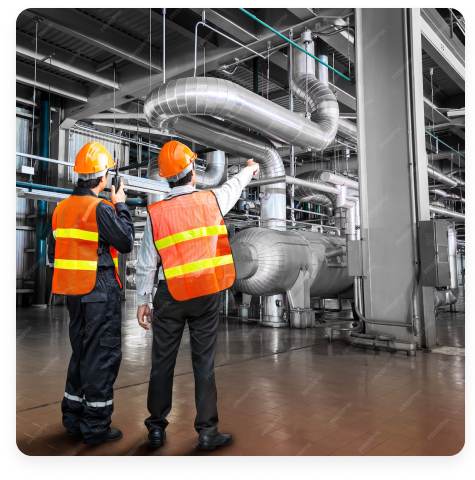API 510 - Pressure Vessel Inspector Course
API 510 course overviews fundamentals and skills of pressure vessel inspector certification preparation. This 5-day training is held in Indonesia & Malaysia
Level
Intermediate
Type
Facetoface

Trusted by Leading Companies
Our training programs are promoted to engineers, supervisors, and technical teams across the globe, supporting their continuous development and operational competency.












About Training
The course prepares the professional for the API 510 exam, answering questions like "what is API 510". The course is an intensive one-week course with a heavy emphasis on the use of codes and mathematical calculations.
API Authorized Pressure Vessel Inspectors must have a broad knowledge base relating to the maintenance, inspection, repair, and alteration of pressure vessels. The API 510 Certification Preparation is designed to equip the professional with such information and understand the exam format. The course will prepare the professional with both parts of the exam, the closed and open book portion.
This is an intense course with daily homework and a final exam (similar to the API 510 exam). A study guide is issued to direct participants’ pre-class study.
Training Objectives
What is API 510 training course objective?
- Successfully pass the API 510 pressure vessel inspector certification exam
- Effectively use major codes: ASME B&PV Sections V, VIII, & IX
- Perform all basic vessel calculations needed for the API exam (e.g. min, test pressure, MAWP, static head, MDMT, corrosion rates, remaining life, etc.)
- Use API’s requirements during inspection, repairs, and alterations of pressure vessels
- Review welding procedures (WPS/PQR) and welder performance qualifications (WPQ)
What you must bring to class
Students should bring to class: a calculator, a straight edge (or triangle), pencils, highlighters, lots of questions, and a “can-do” attitude. Also, participants must bring the appropriate codes required for the API exam (see API website: www.api.org/icp)
Audiences
Who should join API 510 training course by PetroSync?
This course will specifically benefit Engineers, Supervisors, and Managers from the following disciplines:
- Mechanical Engineering
- Inspection
- Maintenance & Operations
- Technical & Engineering
- QAQC
and technical personnel with 2-3 years of experience in the management and planning of inspection and maintenance activities of pressure vessel systems at upstream oil & gas facilities, refineries, process plants, and petrochemical facilities.
Instructor
CM
Chintamani M. Khade
Chintamani M. Khade is a specialist on Materials & Damage Mechanisms. He has more than 19 years experience as Department Head of NDT, Welding Inspection, In Service Inspection in India, Middle East, Southeast Asia & Africa. Currently, he is the technical director of Empirical Technocrats.
He conducted training for various API Certification Preparatory, NDE methods, ASNT & ISNT Level III, advanced NDT Methods, welding inspection, Construction codes, ASME Sections II, Section IX, Section V, ASME Sec. VIII div. 1, ASME B31.1, ASME B31.3, AWS D1.1, UT, MT, PT, VT, RT & Basic for ISO 9712 level 2 & level 3.
He has been a team leader of 100+ multidiscipline NDT technicians, metallurgists & Welding inspectors during various shutdown jobs in Qatar Petroleum, Massaid refinery, Qatar in March – June 2005, March - April 2009 & October November 2009. Executed in service inspection of nearly 800 pressure vessels, Static & rotary equipments, Plant process piping & storage tanks as shutdown coordinator.
Daily Aims
MODULE – 1 : Welcome and Introduction
- Overview of API 510 Course
MODULE – 2 : JOINT EFFICIENCIES
- Weld Joint Categories from UW-3;
- Type of radiography (full, spot, or none , RT-1, RT-2, etc.);
- Joint efficiency by reading Table UW-12;
- Joint efficiency for seamless heads and vessels Sections per UW-12 (d); and
- Joint efficiency for welded pipe and tubing per UW-12 (e).
MODULE - 3 : THICKNESS CALCULATIONS
- The required thickness of a cylindrical shell (UG-27(c)(1));
- The vessel part MAWP for a cylindrical shell
- The required thickness of a head-Hemispherical, Ellipsoidal, Torispherical
- The vessel part MAWP for a head
MODULE - 4 : STATIC HEAD
- Calculate static head pressure on any vessel part;
- Calculate total pressure (MAWP + static head) on any vessel part;
- Calculate maximum vessel MAWP given vessel parts MAWP and elevations
MODULE - 5 : EXTERNAL PRESSURE
- Calculate the maximum allowable external pressure;
- Calculate whether a cylindrical shell meets Code design for external pressure.
IMPACT TESTING
- Determine the minimum metal temperature of a material which is exempt from impact testing (UG-20 (f), UCS-66,UCS-68(c).)
MODULE - 1 : PRESSURE TESTING
- Calculate a test pressure compensating for temperature. (UG-99 & UG-100)
- The precautions associated with hydrostatic and pneumatic testing,
- Steps in a hydrotest Procedure (UG 99 and UG 100)
- All steps in a pneumatic test procedure (UG 100 and UG 102)
MODULE - 2 : WELD SIZE FOR ATTACHMENT WELDS AT OPENINGS
- Conversion of a fillet weld throat dimension to leg dimension , conversion factor(0.707)
- Determine the required size of welds at openings (UW-16).
MODULE – 3 : NOZZLE REINFORCEMENT
- Key concepts of reinforcement, such as replacement of strength and limits of reinforcement.
- Credit for extra metal in shell and nozzle
- Calculate the required areas for reinforcement
MODULE - 4 : SCOPE OF API 510
- SCOPE OF API 510
- General Application
- Specific Applications
- Recognized Technical Concepts
- References
MODULE - 5 : SCOPE OF API 510
- Definitions
- Owner/user inspection organization
- General
- Owner/user Organization Responsibilities
- Inspection, Examination and Pressure Testing practices
- Inspection Plans
- Risk-based Inspection
- Preparation For Inspection
- Inspection For Types Of Damage Modes Of Deterioration And Failure
- General Types Of Inspection And Surveillance
- Condition Monitoring Locations
- Condition Monitoring Methods
- Pressure Testing
- Material Verification And Traceability
- Inspection Of In-service Welds And Joints
- Inspection Of Flanged Joints
- Interval/frequency and extent of inspection
- General
- Inspection During Installation And Service Changes
- Risk-based Inspection
- External Inspection
- Internal And On-stream Inspection
- Pressure-relieving Devices
- Inspection Data Evaluation, Analysis, and Recording
- Corrosion Rate Determination
- Remaining Life Calculations
- Maximum Allowable Working Pressure Determination
MODULE - 6 : SCOPE OF API 510
- Fitness For Service Analysis Of Corroded Regions
- API RP 579 Fitness For Service Evaluations
- Required Thickness Determination
- Evaluation Of Existing Equipment With Minimal Documentation
- Reports And Records
MODULE - 1 : SCOPE OF API 510
- Repairs, Alterations, and Rerating of Pressure Vessels
- Repairs And Alterations
- Authorization
- Approval
- Materials Requirements
- Welding Requirements
MODULE - 2
- Heat Treating Requirements
- Preheating
- Post weld Heat Treating
- Local Postweld Heat treatment
- Repairs to Stainless Steel Weld Overlay and Cladding
- Rerating
MODULE - 3
- Introduction to ASME Sec. IX
- Welding Procedure tests
- Performance qualification tests
- Acceptance criteria
- Welding positions
- P-No, F-No and A-No.
- Review of:
- Welding Procedure Specification (WPS); and
- Procedure Qualification Record (PQR)
- And determine:
- Whether number and type of mechanical test listed on PQR are appropriate
- Whether the results of the tests are acceptable
- Whether all required essential and non-essential variables have been properly addressed.
MODULE - 1 : API RP 576, Inspection of Pressure-Relieving Devices
- Relief Devices
- Description of Types -- (API RP-576, Section 2)
- Causes of Improper Performance (API RP-576, Section 4)
- Reasons for Inspection and Frequency Determination (API RP 576, Sections 3 & 5)
- Inspection and Test Service Procedures (API RP-576, Sections 6 and 7)
MODULE - 2
- Article 1, General Requirements:
- Article 2, Radiographic Examination
MODULE - 3
- Article 6, Liquid Penetrant Examination,
- Article 7, Magnetic Particle Examination (Yoke and Prod techniques only):
- Article 23, Ultrasonic Standards, Section SE–797
MODULE - 4 : API RP 576, Inspection of Pressure-Relieving Devices
- Relief Devices
- Description of Types -- (API RP-576, Section 2)
- Causes of Improper Performance (API RP-576, Section 4)
- Reasons for Inspection and Frequency Determination (API RP 576, Sections 3 & 5)
- Inspection and Test Service Procedures (API RP-576, Sections 6 and 7)
MODULE - 5 ( 1 hour + 1 hour discussion )
- Practice Examination-Open Book
- Practice Examination-Closed Book
- Feed Back and Closing
Training Schedule
| Code | Start Date | End Date | Locations | Cost | Instructor |
|---|---|---|---|---|---|
| PST0086-202601 | 06 Apr, 2026 | 10 Apr, 2026 | Bandung, Indonesia | USD 3350 | Chintamani M. Khade |
| PST0086-202602 | 29 Jun, 2026 | 03 Jul, 2026 | Kuala Lumpur, Malaysia | USD 3350 | Chintamani M. Khade |
| PST0086-202603 | 31 Aug, 2026 | 04 Sep, 2026 | Bandung, Indonesia | USD 3350 | Chintamani M. Khade |
| PST0086-202604 | 16 Nov, 2026 | 20 Nov, 2026 | Kuala Lumpur, Malaysia | USD 3350 | Chintamani M. Khade |
Why Choose This Training
Credibility
Align with API/ASME standards. Trusted by major operators.
Expert Instructors
Led by industry veterans with real field experience.
Real Case Studies
Practical application of concepts through real world scenarios.
Practical Skills
Hands on calculations and decision making for FFS outcomes.
Trusted by Operators
Delivered to Aramco, ADNOC, SABIC, and other major operators.
Global Training Standard
Recognized across major industries by PetroSync's proven approach.
Professional Training Aligned with Industry Standards
Practical, industry ready training designed for real work environments
Limited seats available

Frequently Asked Questions
-
Direct Transfer
PetroSync Global Pte Ltd Bank Details:
- Account Name: PetroSync Global Pte Ltd
- Bank Name: DBS Bank Ltd
- Bank Code: 7171
- Bank Swift Code: DBSSSGSGXXX
- Branch Code: 288
- Account No: 0288-002682-01-6-022 (USD)
- Bank Address: 12 Marina Boulevard, Level 3, Marina Bay Financial Centre Tower 3, Singapore 018982
-
Terms & Conditions:
- For payment via direct telegraphic transfer, clients must bear both local and overseas bank charges.
-
Credit Card:
Terms & Conditions:
- A 4% credit card processing fee applies for credit card payments.
- Delegates who cancel after the training has been officially confirmed via email are required to pay the full course fee, and no refunds will be granted. However, you may substitute delegates at any time as long as reasonable advance notice is given to PetroSync.
- If PetroSync cancels, postpones, changes the trainer, or alters the training location (classroom/virtual) for any reason, and the delegate is unable or unwilling to attend on the rescheduled date, a 100% credit voucher of the paid contract fee will be issued. This credit voucher can be used for another PetroSync training program, subject to mutual agreement, within one year from the postponement date.
- PetroSync is not responsible for any loss or damage resulting from the cancellation policy and assumes no liability if the event is canceled, rescheduled, or postponed due to force majeure (e.g., natural disasters, war, government actions, industrial actions).
If PetroSync cancels, postpones, changes the trainer, or alters the training location (classroom/virtual) for any reason, and the delegate is unable or unwilling to attend on the rescheduled date, a 100% credit voucher of the paid contract fee will be issued. This credit voucher can be used for another PetroSync training program, subject to mutual agreement, within one year from the postponement date.
Yes, participants who complete the training will receive either an attendance certificate or a completion certificate, depending on the course requirements.
Yes, PetroSync courses adhere to international standards , with expert instructors in fields such as API, ASME, Reliability, and Drilling & Well Engineering.
Yes, PetroSync certificates are widely recognized and can be used to fulfill professional development and certification requirements across various industries.
Yes, PetroSync offers customized training programs tailored to your organization's specific needs (In-house Training).
Participants will receive comprehensive training materials , including slides, handouts, and direct learning from experts with case studies related to the training topic.
PetroSync trainers are industry experts with extensive experience as instructors and consultants in their respective fields, providing professional training with a strong background in the industry.
Yes, trainer profiles, including their qualifications, experience, and expertise, are available on the website: https://www.petrosync.com/training/.
Online training sessions are conducted via user-friendly platforms such as Zoom Premium.
To access PetroSync Online Training, participants need:
- A computer or laptop (tablets or smartphones are not recommended)
- A reliable broadband internet connection (minimum 4 Mbps)
- A webcam and a headset
- Any internet browser (Chrome browser recommended for a better experience)
- A reasonably quiet place
Yes, PetroSync provides live Q&A sessions with instructors to address real-world challenges encountered during training.
The average number of participants varies depending on the topic and participants’ schedules.
- The information you provide will be safeguarded by PetroSync and may be used to keep you informed of relevant products and services.
- As an international group, we may transfer your data globally for the purposes indicated above.
- If you do not wish to share your information with other reputable companies, please tick the box on the registration form.
Please fill out the form on the designated page first. Our team will reach out to you within a maximum of 2x24 hours.
The latest training schedule is available on the website: https://www.petrosync.com/training/.
